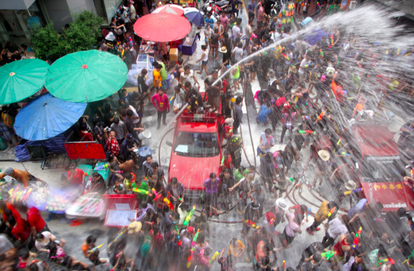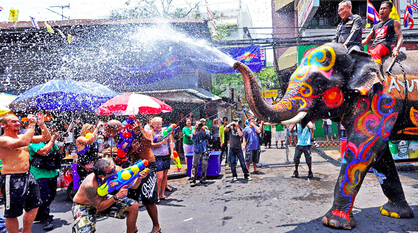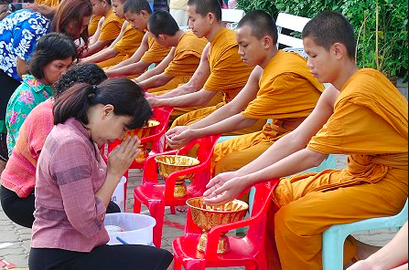
2. Thailand’s New Year is called “Songkran” and celebrated in mid April, the hottest time of the year in the southeast Asian country.
3. But it’s not just a one-night affair, as the Thai New Year observation goes on for three full days. While it used to be a floating hotel with dates that changed slightly depending on the year, Songkran is now set for the 13th to the 15th of April.
4. Songkran is quite possibly the most unique New Year in the world, celebrated with a national water festival that’s grown to legendary proportions. Not only do all Thais take part, but also tens of thousands of farang (foreigners) visit the country every year to join in the wet and wild festivities.
5. For those three days, the streets basically become a massive water fight, with every man, woman, and child (but especially teens, young adults, and now, tourists) throwing water on each other unmercilessly.
6. It’s also the longest holiday in Thailand, running three full days, day and night. However, in some parts of the country that are vacation spots or cater to tourists, etc. the water fights sometimes go on for a full week!
7. For weeks ahead of the New Year, you’ll see giant water pistols and crazy, colorful Hawaiian-style shirts sold on the side of the road in anticipation of the antics. Thais will also resort to garbage pails full of water, hoses, and buckets – whatever it takes to soak their fellow man or woman.
8. In cities, you’ll even see big tanker trucks driving around delivering water (or soaking people themselves) and delivery trucks also deliver blocks of ice, deposited in the trash pails so the soaking will be frigid as well.
9. Everyone is fair game to get doused with a bucket of water when they are walking around during Songkran. Tourists who wish “not to participate” better stay in their hotel rooms for those three days or not come to Thailand!

10. Water isn’t the only thing thrown around, as children and other Thais love smearing others with colorful paste, especially all over their faces. Don’t worry – it’s just colored talcum powder, and considered a good thing or a blessing if they gift you with a handful of paste to the face. The use of chalk during the water festival originated from the practice of monks marking blessings with colorful chalk.
11. Some mischievous Thais even add a little Tiger Balm to their talcum powder paste, which will make your skin tingle a little but isn’t harmful.
12. There are a few exceptions to the water fight free-for-all during Songkran; you should never ever throw water on Buddhist monks, police officers and other officials, or babies, toddlers and the elderly.
13. Where does this delightful tradition come from? Although it’s been a Thai holiday throughout its entire history, the origins of Songkran are from from neighboring Burma. The word Songkran derives from the word “saṃkrānti” which literally means “astrological passage” and relates to movement or change from the bad of the old year into the good of the new.
14. Songkran parallels the rising of Aries on the astrological chart, which is the calendar of many countries in Asia and keeps with the Buddhist and Hindu solar calendar.
15. How should you prepare for Songkran? Other than catching up on sleep and taking a lot of vitamin C (since everyone is partying overtime and soaking wet – and the cleanliness of the water can be suspect – it seems like the whole country catches a cold after Songkran,) you’ll want to bring the right things. Cheap sunglasses (or even goggles!), athletic shorts that dry easily, a dry wick shirt, boat shoes or flip flops (though those slide around a lot), waterproof sunscreen or a hat (tourists often forget about the strong sun since they are always wet, often getting a bad sunburn), and DEFINITELY a quality waterproof bag or case for your phone, money, hotel key, etc.
16. With all of the water fight “sanuk” (fun) going on, don’t forget the true meaning of the New Year holiday. Traditionally and still to this day, Songkran is a time for Thais to symbolically cleanse and rejuvenate their bodies and souls to end the year, preparing for good fortune in the new year to come.
17. For most Thais, Songkran is a time to return home to be among family, paying respect to elders. Children pour water over the palms of their parents and grandparents in a sign of thanks and reverence for their ancestors.

18. Once back at home, children and family visitors alike help the housewife clean her residence spotlessly, as any remaining rubbish or dirt will bring back luck. Any images of Buddha are also washed with the utmost attention and care. Once Songkran start, Thais visit the local temple to pray and offer food and alms to the Buddhist monks, as well as pouring water over them to purify their sins and bring good luck.
19. In most cities in Thailand, there will also be colorful parades in the streets and beauty pageants with traditional costumes where “Miss Songkran” is coronated.
20. Thais may observe their New Year holiday with slight differences based on region. For instance, in central Thailand, Thais often perform “merits” like releasing birds or fish back into the wild, and some Thais even release bigger animals like buffalos or cows to their freedom.
21. In southern Thailand, Songkran is also known as “free day,” and residents make sure to observe the only three rules that apply during the festival: people shouldn’t work and shouldn’t spend money; they should not hurt people or other animals; and they should not lie.
22. 2In the north of Thailand, there is always gunfire and firecrackers shot off into the sky to scare away bad luck. During the days, people prepare food and collect other practical household items and gift them to the local monks at the temple, where they also bath Buddha’s statue.
23. While the intent of the water festival is all fun and blessings, the unfortunate reality is that there are many accidents and injuries on the roads during Songkran due to drunken motorcycle driving more than just wet roads. If fact, police statistics show that the death toll from roadway accidents doubles every Songkran, in a country that already has one of the highest road fatality rates in the world. Be careful and “Songkran responsibly!
24. In 2016, Songkran will take place April 13-15. Instead of just a big party, the Thai government and cultural authority is asking that all people – Thai and farang – focus on the spiritual message and intention of the traditional holiday.
25. Having experienced the Songkran festival many times all over the country, I definitely urge tourists to take part - but also observe the true meaning. Bangkok, Phuket, Pattaya, Koh Samui, Chang Mai, and even anywhere in the remote provinces are all great places to experience Songkran. Have fun, be safe, and get ready to be WET!
-Norm :-)
 RSS Feed
RSS Feed